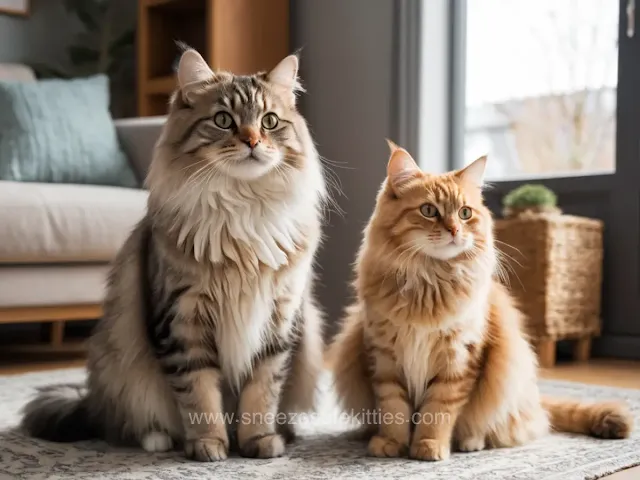Tips for Boosting Your Hypoallergenic Cat's Immune System Naturally
 |
| Hypoallergenic Cat's Immune System |
Are you a proud owner of a
hypoallergenic cat? While these feline friends are a blessing for allergy sufferers, they still need a robust immune system to stay healthy and happy. But here's the catch: many cat owners overlook the importance of
immune health, leaving their furry companions vulnerable to illness and discomfort.
Nutrition for Immune Support
Essential nutrients for feline immune function
A well-balanced diet is crucial for maintaining your
hypoallergenic cat's immune system. Key nutrients include:
- Proteins
- Vitamins (A, C, E)
- Minerals (zinc, selenium)
- Omega-3 fatty acids
These nutrients work together to support
immune cell production and function, enhancing your cat's natural defenses against diseases.
Beneficial supplements for immune boosting
While a balanced diet should provide most necessary nutrients, some supplements can further enhance your cat's
immune system:
- Probiotics: Support gut health and overall immunity
- L-lysine: May help with respiratory health
- Fish oil: Rich in omega-3 fatty acids
- Antioxidants: Combat free radicals and support cellular health
Always consult with your veterinarian before introducing any new supplements to your cat's diet
Proper hydration techniques
Adequate hydration is crucial for maintaining a robust
immune system. Encourage your
hypoallergenic cat to drink more water by:
- Providing multiple water sources throughout your home
- Using cat water fountains to simulate running water
- Adding low-sodium broths to their diet occasionally
- Incorporating wet food into their meals
By ensuring proper nutrition and hydration, you're laying a strong foundation for your
hypoallergenic cat's immune health.
Environmental Factors for Optimal Health
Let's explore how environmental factors play a crucial role in boosting your
hypoallergenic cat's immune system.
Creating a stress-free living space
A calm environment is essential for your cat's overall well-being. Consider the following tips to create a stress-free home:
- Provide quiet, cozy spaces for your cat to retreat
- Use pheromone diffusers to promote relaxation
- Maintain a consistent daily routine
- Minimize loud noises and sudden changes in the environment
Importance of regular exercise
Regular physical activity is vital for your
cat's immune health. Encourage exercise through:
- Interactive toys
- Climbing structures
- Laser pointers
- Daily play sessions
Reducing exposure to toxins and allergens
Minimize your cat's contact with harmful substances to support their
immune system:
- Use natural, pet-safe cleaning products
- Keep toxic plants out of reach
- Regularly change air filters in your home
- Opt for unscented cat litter to reduce allergen exposure
By optimizing your hypoallergenic cat's environment, you're setting the foundation for a robust
immune system.
Natural Remedies to Enhance Immunity
Herbal Supplements for Cats
Certain herbs can provide a natural boost to your
hypoallergenic cat's immune system. Consider these options:
- Echinacea: Stimulates immune function
- Astragalus: Supports overall health and vitality
- Cat's Claw: Known for its anti-inflammatory properties
- Calendula: Aids in wound healing and skin health
Always consult with your veterinarian before introducing any herbal supplements to your cat's diet.
Probiotics and Their Immune-Boosting Effects
Probiotics play a crucial role in maintaining a healthy gut, which is closely linked to immune function. Here's why they're beneficial:
- Improve digestive health
- Enhance nutrient absorption
- Strengthen the immune system
- Reduce the risk of infections
Look for cat-specific probiotic supplements or consider adding small amounts of plain, unsweetened yogurt to your cat's diet.
Essential Oils Safe for Feline Use
While cats are sensitive to many essential oils, some can be used safely in diluted forms:
- Lavender: Calming, stress-reducing
- Frankincense: Anti-inflammatory, immune-boosting
- Helichrysum: Wound healing, pain relief
Always use high-quality, therapeutic-grade oils and consult with a holistic veterinarian before use.
Homeopathic Options for Immune Support
Homeopathy offers gentle yet effective remedies for boosting immunity:
- Thuja: Supports overall immune function
- Silicea: Strengthens the body's defense mechanisms
- Echinacea angustifolia: Enhances the immune response
- Arsenicum album: Aids in detoxification and immune support
Cautions and Considerations for Natural Treatments
While natural remedies can be beneficial, it's essential to approach them with caution:
- Always consult with a veterinarian before starting any new treatment
- Start with small doses and monitor your cat's reaction
- Be aware of potential allergic reactions or sensitivities
- Avoid using multiple treatments simultaneously without professional guidance
- Remember that natural doesn't always mean safe – some herbs and oils can be toxic to cats
By carefully incorporating these natural remedies, you can help enhance your
hypoallergenic cat's
immune system. However, it's crucial to remember that these should complement, not replace, proper nutrition, regular exercise, and routine veterinary care.
Preventive Care and Regular Check-ups
Let's focus on the critical role of preventive care and regular check-ups in maintaining their overall health.
Parasite prevention strategies
Protecting your
hypoallergenic cat from parasites is vital for their
immune health. Consider these strategies:
- Use veterinarian-recommended flea and tick preventatives
- Administer regular deworming treatments
- Keep your cat indoors to minimize exposure to parasites
- Clean and disinfect your cat's living area regularly
Early detection of health issues
Regular check-ups enable early detection of potential health problems. Be vigilant for signs such as:
- Changes in appetite or water intake
- Unusual weight loss or gain
- Alterations in litter box habits
- Behavioral changes or lethargy
Conclusion
Maintaining a strong
immune system is crucial for your
hypoallergenic cat's overall health and well-being. By focusing on proper nutrition, creating a stress-free environment, incorporating natural remedies, and staying up-to-date with preventive care, you can significantly boost your feline friend's ability to fight off illnesses and stay healthy.

